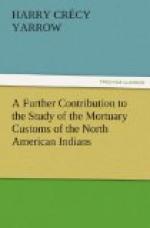The Chippewas believe that there is in man an essence entirely distinct from the body; they call it Ochechag, and appear to supply to it the qualities which we refer to the soul. They believe that it quits the body it the time of death, and repairs to what they term Chekechekchekawe; this region is supposed to be situated to the south, and on the shores of the great ocean. Previous to arriving there they meet with a stream which they are obliged to cross upon a large snake that answers the purpose of a bridge; those who die from drowning never succeed in crossing the stream; they are thrown into it and remain there forever. Some souls come to the edge of the stream, but are prevented from passing by the snake, which threatens to devour them; these are the souls of the persons in a lethargy or trance. Being refused a passage these souls return to their bodies and reanimate them. They believe that animals have souls, and even that inorganic substances, such as kettles, &c., have in them a similar essence.
In this land of souls all are treated according to their merits. Those who have been good men are free from pain; they have no duties to perform, their time is spent in dancing and singing, and they feed upon mushrooms, which are very abundant. The souls of bad men are haunted by the phantom of the persons or things that they have injured; thus, if a man has destroyed much property the phantoms of the wrecks of this property obstruct his passage wherever he goes; if he has been cruel to his dogs or horses they also torment him after death. The ghosts of those whom during his lifetime he wronged are there permitted to avenge their injuries. They think that when a soul has crossed the stream it cannot return to its body, yet they believe in apparitions, and entertain the opinion that the spirits of the departed will frequently revisit the abodes of their friends in order to invite them to the other world, and to forewarn them of their approaching dissolution.
Stephen Powers, in his valuable work so often quoted, gives a number of examples of superstitions regarding the dead, of which the following relates to the Karok of California:
How well and truly the Karok reverence the memory of the dead is shown by the fact that the highest crime one can commit is the pet-chi-e-ri the mere mention of the dead relative’s name. It is a deadly insult to the survivors, and can be atoned for only by the same amount of blood-money paid for willful murder. In default of that they will have the villain’s blood. * * * At the mention of his name the mouldering skeleton turns in his grave and groans. They do not like stragglers even to inspect the burial place. * * * They believe that the soul of a good Karok goes to the “happy western land” beyond the great ocean. That they have a well-grounded assurance of an immortality beyond the grave is proven, if not otherwise, by their beautiful




